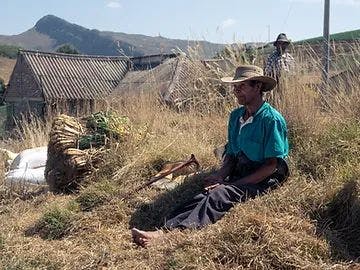They use environmental education to preserve their lake

In the Boyacá region of Colombia, Fundación Montecito is fighting to protect Colombia's largest lake, Lake Tota. Their fight begins with environmental education for the local population.
An eco-system in danger
Located at an altitude of over 3,000 m in the Boyacá region, Lake Tota boasts an eco-system rich in exceptional biodiversity. Indeed, there are 94 species of bird, 3 of which are endemic to the lake. By way of comparison, in France, there are 578 bird species, only one of which is endemic.

This biodiversity can be explained by the high concentration of marshes all around the lake, providing an abundant environment conducive to diversity. But if Lake Tota is so well known in Colombia, it's probably more for its huge onion and trout crops than for its bird species. Today, however, these intensive crops are threatening the wetlands and endangering one of the endemic bird species, which is on the brink of extinction.
The intensive use of pesticides, over-consumption of water and toxic waste from crops are all reasons why the lake's water is becoming less and less healthy, posing a problem not only for its biodiversity but also for the locals themselves who consume the water. This is where the Fundación Montecito comes in, to try and get things moving.

Environmental education, a key weapon
A farmer rests after the harvest. After numerous studies and a good knowledge of the terrain, the Fundación Montecito has discovered several eco-responsible solutions that would enable farmers to maintain the same productivity while preserving the lake's eco-system as it is.
Of course, some of these solutions require an initial financial investment, but contrary to what one might think, the financial situation of the farmers on Lake Tota is far from deplorable. Their onions and trout are exported all over Colombia at very good prices and are highly reputed.
So what's the problem? If they could do otherwise, one has to wonder why farmers would poison the water they drink. It's quite simple: ignorance. Indeed, most farmers in the region have received only a basic education and are certainly not up to date with the latest eco-responsible farming techniques. What's more, it's difficult to get them to change their farming methods until they see the benefits. This is where Fundación Montecito comes in.
The Fundación Montecito solution
A child learns to plant trees. This organization works to educate the local population about the environment from the earliest age at elementary school. They start by inspiring young future farmers to protect their lake by teaching them all the secrets of the biodiversity it harbors: the names of birds, plants, how to recognize them, and so on.
Secondly, Fundaciòn Montecito has created the "El Muyso" environmental festival, based on an urban legend about a monster that lives in the lake.
-> The aim was to use this legend as a metaphor for the toxic waste discharged into the lake. During the festival, a number of speakers give lectures, and committed and traditional music groups perform. A student carries out an environmental activity.
These are just some of the solutions found by the Fundación Montecito to address a local issue. Of course, the organization acts on many other levels, alerting government institutions to the need for more far-reaching action. For more information, please visit their website here:
Finally, it's possible to do international volunteer work with them. If you're interested, please contact us for further information.
Environment
|Photography
|Critical Thinking
|